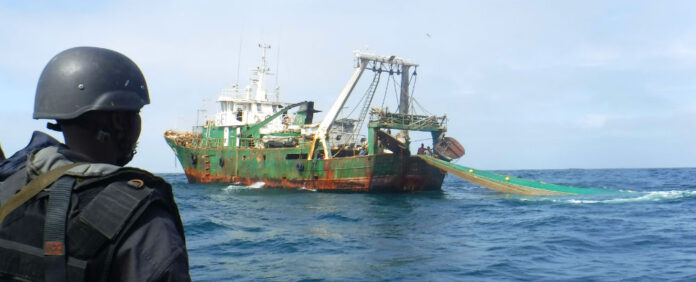The Nigerian Trawlers Owners Association (NITOA) on Thursday said that the menace of illegal, unreported and undocumented fishing had led to the depletion of fishing trawlers in the country .
Mrs Benedette Okonkwo, President of the association said this at the Zoe Maritime Resources Ltd., Maritime Business Roundtable Breakfast Meeting (MBRBM) on fishing and fisheries in Lagos.
According to Okonkwo, her members has a combined fleet of over 250 vessels and over twenty fishing companies which had drastically reduced to 150 vessels with about five presently struggling to survive.
Okonkwo noted that illegal fishing activities in the country also threatens Nigeria’s blue economy prospects and urged the government to do more to grow the fishing industry in Nigeria.
“NITOA has been involved in industrial fishing activities in Nigeria since 1986 when some notable Nigerians initiated the idea of having a unified body to represent its members on issues of mutual interest.
“There is the need to establish Fisheries Terminal here in Lagos where about 95 per cent of the industrial fishing operators are based.
“Furthermore government should do well to resuscitate the Export Expansion Grant (EEG) Scheme to make it more robust workable and transparent,” she said.
She lamented that trawler owners are overburdened by overzealous government agencies overseeing sea fishing, adding that it was detrimental to the growth of an industry that should be a veritable source of local fish supply and foreign exchange earnings for the nation.
“There is the need for the government to sit down with NITOA to chart a common course so as to harmonise the processes and procedures to attract more local and foreign direct investment.
“ Other areas that government must look into include; high cost of statutory registration and renewals of trawlers particulars from the regulatory agencies; occasional pirate attacks at high sea leading to loss of lives and property as well as damage of vessels and machines,” she said.
Mrs Enitan Solarin, Director, YOA Insurance Brokers noted that there was need to create insurance awareness to the fishing industry, the collaboration between fisheries, regulators and insurance industry.
Solarin represented by Mrs Bolanle Anjorin added that enforcement by regulatory agencies with respect to insurances such as Protection & Indemnity, Hull & Machinery Third Party Liability-alm would contribute to improve the working conditions of fishers and fishing practices.
She pointed out that fishermen need financial incentives by government and other bodies and enforcement of regulations curbing illegal fishing so that the industry would move forward.
“As with all uncertainties, insurance plays an important role in the fishing sector as it provides financial compensation for unforeseen events.
“The Food and Agriculture Organisation (FAO) Code of Conduct for Responsible Fisheries recognises the importance of insurance in fisheries.
“Its article 8.2.8 emphasises that owners or charterers of fishing vessels should carry sufficient insurance cover to protect the crew of such vessels and their interests, to indemnify third parties against loss or damage and to protect their own interests,” he said.
Also speaking, the Vice President of Fisheries Society of Nigeria, Dr Olalekan Oguntade observed that there was a dire need for sufficient up-to-date data on IUU fishing to be able to analyze the extent of the menace and the best approach to address it.
“On IUU Fishing, there should be a NEEDS assessment of the industry. We equally need to protect the artisanal fishing industry which is where most riverine communities operate,” he said.
In her welcome remarks, the Chairman, Zoe Maritime Resources Limited, Mrs. Oritsematosan Edodo-Emore opined that Nigeria’s vast coastline and her Exclusive Economic Zone (EEZ) has immeasurable fish resources which ordinarily should transform her economy if properly harnessed.
“It is on record that with a population of about 140 million local demand for fish far outweighs the supply. This means that there is constant demand for fish and fish products which should keep the local fishing industry bouyant. The reality on ground tells a different story.”
“The records show that there has been a steady decline in local catch and production of fish in Nigeria. In the 1970’s domestic production of fish was said to range from 600,000 to 700,000 tons By 1983 this dropped to $38.00 tons in 2000, local catch was 441,337 and today the figure is no better.
“Responsibility for this decline has been laid at the feet of IUU fishing. This involves trawlers coming from other jurisdictions to sweep the Nigerian coast not only of sizeable fish supplies but also her juveniles,” she said.
Edodo-Emore pointed out that as Nigeria begin to develop her blue economy, the challenges of IUU fishing must be tackled headlong.




